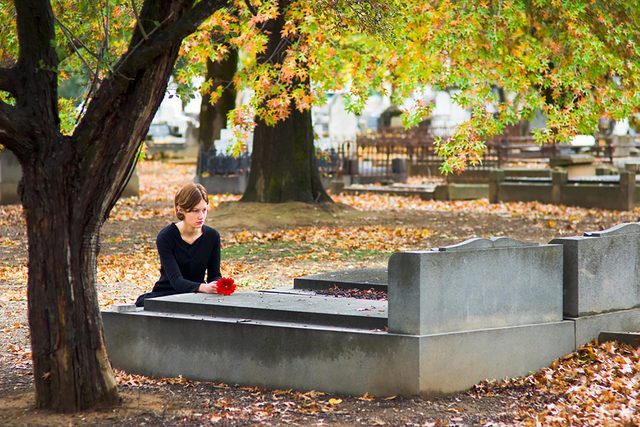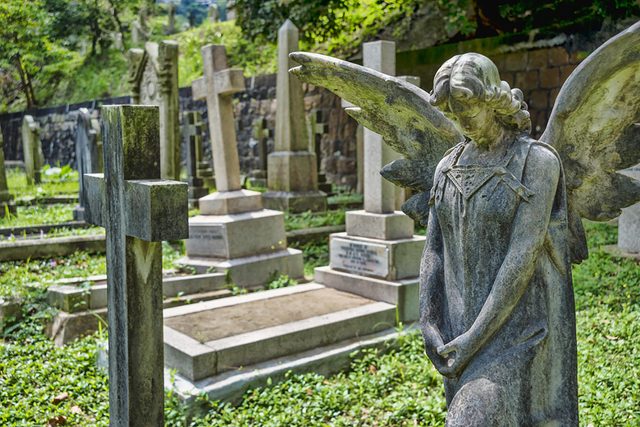Dying is Easy Young Man Living is Harder
1 / 8

Remember what matters
Dianne Gray was a 42-year-old single mom when her 14-year-old son Austin died. Gray, now the president of Elisabeth Kubler Ross Foundation, places an emphasis on knowing what matters in life. This means experiences over stuff and people over material possessions. She says, "Having a person you love die smacks you upside the side head and gets your priorities in order. I used to spend years agonizing over the perfect armoire, the perfect rug, and the perfect paint color. It doesn't matter. It's just stuff." This philosophy also shows up in Gray's work where she works with the dying to help them figure out how they want to live until they go. Her terminally ill patients don't tell her about how much their car meant to them. Tell they her they will miss spending time with their dog, how they wish they could play with their grandchildren more, or how they want to be there when their daughter gets married. Gray says, "You realize things like the kind of car you drive or house you live in doesn't matter." Reminder: Don't forget these easy ways to live in the moment.
2 / 8

There's one question we'll all have at the end of our life
When death nears some ask one big question: Will I be remembered? In other words, we will, on some level, ask, "Does my life matter?" Gray says, "People want to know they will be remembered." The work of being remembered might not be about starting the next big tech company or reaching celebrity status but building memorable moments, making a difference and being your authentic self. If this is the question we'll ask when we die, the question that comes up in our life is, how do I want to be remembered? Maya Angelou's classic quote is "I've learned that people will forget what you said, people will forget what you did, but people will never forget how you made them feel." Here are ideas on how to make someone's day.
3 / 8

Seek healing
There's a lot of emphasis placed on physical healing—when someone goes into remission after a diagnosis, when surgery goes well, when someone is cured. Yet so much of life is unresolved—friendships that fizzled out, lovers that got away, siblings you had a falling out with. While some experiences are totally cut and dry, others are a mystery and we often live with a lot of unknowns. Gray says, "There's almost always something magical that happens at the end of someone's life—a healing of some sort—it can be emotional, or spiritual—but it's so powerful." The healing could be between estranged siblings or old friends. (These are the 14 things science can teach you about forgiveness.) Sometimes Gray sees this healing through a conversation where someone sees a prominent story from their life with newfound compassion or finally reframes a way of thinking that was hurting them.
4 / 8

When your gut tells you to do something, do it
Sometimes the bumper sticker sayings speak the truth: go with your gut. This popular adage becomes more profound in the context of mortality, says Barbara Moore, manager of Support Services and Director of Camp STARS, a bereavement camp she helped start at Visiting Nurse Health System in Georgia. "The one thing I have learned is that if your gut tells you to do something, you better do it!" she says. Here's how she learned this lesson: A family of one of the system's patients donated clocks for all the rooms in the inpatient center. One night, they delivered the last clocks one night around 9 p.m. Moore was still at work getting ready for camp. She debated when she should write a thank-you note to show her appreciation for the donation. Should she do it that night? Or wait for the morning? She told us, "I did it before I left. I placed the note in the patient's room. She died in the early morning." Going with your gut is a skill you start building now. How to tap into your intuition for a happier life.
5 / 8

Forgive yourself
It's not uncommon to carry around intense guilt. Maybe we blame ourselves for things we've done or haven't done or we feel remorse for paths taken and not taken. Even though there's a breadth of advice for reducing guilt, it's not always easy to let go of habitual mental self-flagellation. (These are the 22 things you can do to stop feeling guilty.) Michael Arciga, a social worker and chaplain with Crossroads Hospice, says that a terminally ill patient's faith tradition can influence their end-of-life-concerns. "When patients of a spiritual background have regrets, fears, and worries, they need to hear that God forgives them unconditionally and that His faithfulness to them has never changed," says Arciga. Spiritual restlessness is bound to arise at the end of our lives so it behooves us to comfort ourselves and explore what it means to be forgiven now. Seeking self-forgiveness can be healing and this desire may show up in life and death.
6 / 8

Pursue family harmony
When asked what people on the deathbed desire most, Gray told us, "They don't want their family members to be in disharmony." An illness or loss in the family can stir up ugly fights–haggling over money, drudging up secrets, or unleashing buried resentments. This longing for unity may be connected with the desire to leave behind a peaceful legacy. Few people want their family legacy rife with tension so it makes sense that dying people will express hopes for reconciliation between loved ones. In many cases, it's complicated but solutions can be simple. Here's how to make your relationship with your adult sibling better.
7 / 8

Tell people what you want them to know
Sharing words of love, affirmation and encouragement can radically influence others in positive ways, but opening yourself up to that vulnerability can be hard and it's easy to hold back in our interactions. Amy Joy Smith, an on-call nurse with Crossroads Hospice in Pennsylvania, says, "Tomorrow is not promised. All we truly have is the moment we are in. Never miss an opportunity to tell someone how you feel." Gray remembers an 81-year-old man who was dying on Christmas Eve. He wanted his family to have no reason to be sad. He reminded his loved ones that he went on over 40 cruises, had the opportunity to marry the love of his life, and that he's not afraid to die.
8 / 8

Create a great life story
The hospice and palliative care staff all seemed to echo a similar sentiment: it's likely we will die how we live. Arciga says, "Generally speaking, patients who have lived lives of faith, goodness, generosity, kindness, and joy can die very peacefully and with many loved ones around them sharing beautiful memories. One could say that the opposite is somewhat true as well." While we're still living, we can make choices about the stories our lives will tell. As we pass, we'll want to tell our stories—our love stories, our survivor stories, our heroic stories, our parenting stories, our career stories—what will be the theme of these stories? Here are the questions to ask your parents before it's too late.
Originally Published: September 14, 2017
Source: https://www.rd.com/list/lessons-from-the-dying/
0 Response to "Dying is Easy Young Man Living is Harder"
Post a Comment